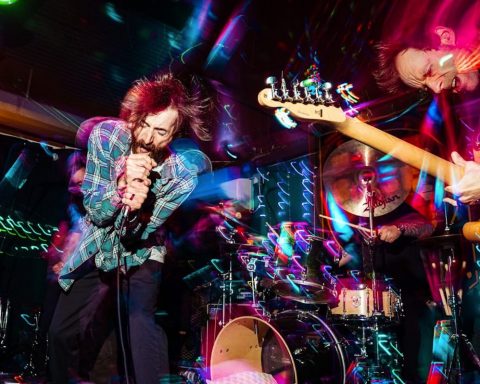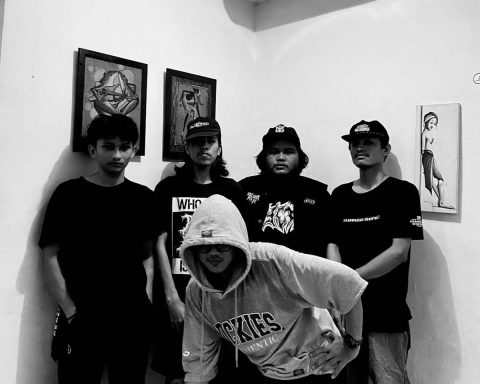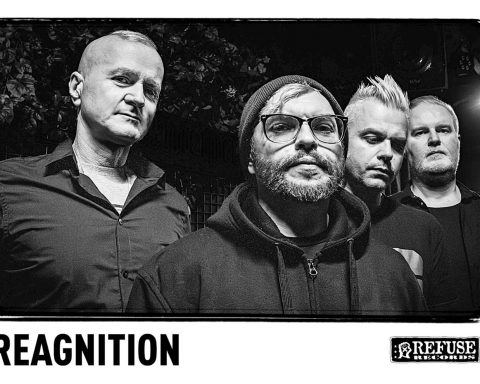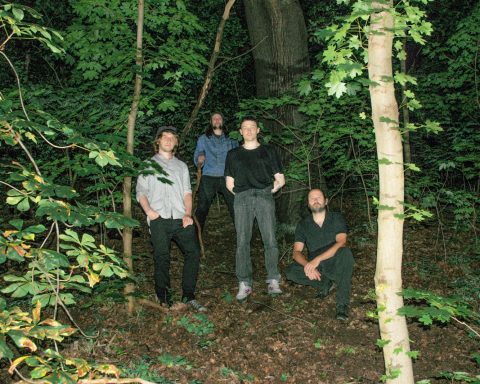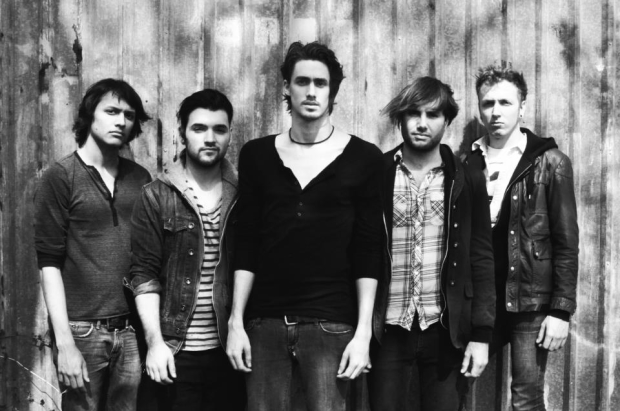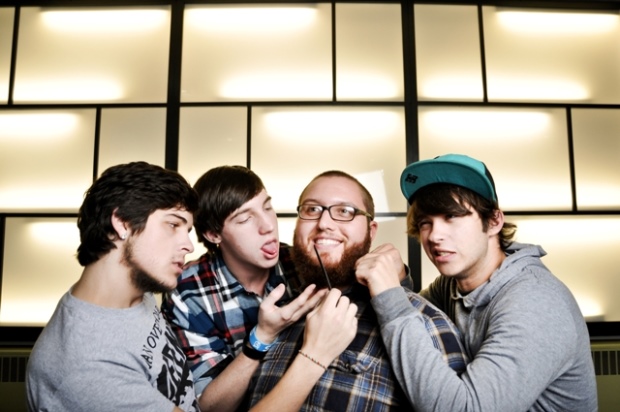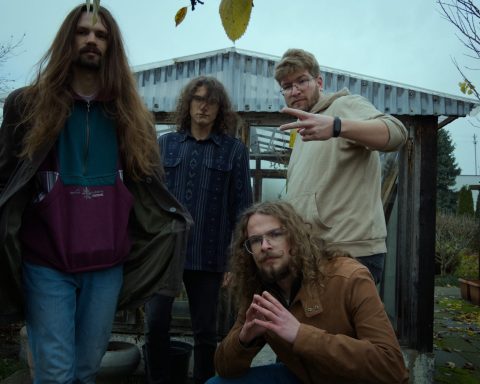Oh yeah.. and not only sludge, to be honest. This Tilburg, The Netherlands-based band call themselves IZAH and are all very broadly oriented in their musical preferences. In their sound you’ll hear various influences coming from post-rock, sludge, noise, ambient, hardcore, or black metal. Almost every song explores some different sounds, themes or genres, but there is always a recognizable, heavy and often melancholic base in them that will make the whole sound like an IZAH track.
The band consists of Tijs van Wegberg (drums), Michel de Jong (synth and guitar), Twan Bastiaansen (guitar and visual artwork), Frans Terhorst (bass and live visuals), Sierk Entius (vocals, noise-synth and lyrics) and Roel van Oosterhout (guitar and songwriting), who represented the band in the following interview.
Welcome, gentlemen! :) What brings you here is obviously your newest killer release, a split with FIRE WALK WITH US. But first, let’s go back to the beginning. How do you remember your early days as a band? What was the idea behind the creation of IZAH?
It was pretty hard getting this band together. When Sierk and I founded the band we placed some online ads describing what direction we wanted to go with this band and what some of our influences were (NEUROSIS, CONVERGE, MONO, SHORA, to name a few). Most people that responded had never heard of the bands we named and thought we were going to be some kind of DREAM THEATER-like band, and most of them thought we were crazy for downtuning our guitars to B. Needless to say these weren’t the people we were looking for. After we finally got a basic line-up together and started playing, several people have left and joined the band, mostly because of differences in ambition. We now have a pretty stabile line-up of people that are passionate about the music and are willing to work for it.
We first found a bassplayer and our drummer Tijs, so we started playing in a basic setup of drums, bass, guitar and vocals. After a while our second guitar player Twan joined and several bass players later, Frans joined. The latest to join was Michel, our synth and third guitar player. With gaining these people we gained more possibilities in creating sounds, which is apparent in the songwriting, especially on the upcoming album. The idea behind IZAH wasn’t much different from most other bands I suppose: forming a band to create the music we love and that would serve as an emotional outlet.
What are some of your biggest inspirations that have contributed directly to your writing and musical style?
I find inspiration for new ideas in any kind of music. When a song gets to me or challenges me in some way there’s usually something there I can learn from. Therefore I learn more about songwriting almost every day. One of the bands that have been of great influence on me is SONIC YOUTH. Listening to their music taught me that there are really no creative restrictions or obligations in songwriting. You don’t need steady structures, you don’t need scales, you don’t even need chords or rhythms. The only thing you need is creativity. Music should be about free expression, so any way of expressing yourself in a manner that is meaningful to you is legit. Anything goes. Other artists that (for me at least) have demonstrated there are no restrictions in composing music are KATE BUSH and GODSPEED YOU! BLACK EMPEROR. If you’ve ever listened closely to BUSH’s albums ‘The Dreaming’ and ‘Hounds of Love’ for example, you know she’s not ‘just’ a great pop artist. Her eccentric way of songwriting draws on many different influences which she skillfully crafts together into a coherent song that is very easy to listen to, yet there are all these different layers moving in often opposite directions at the same time. The welding together of sounds and genres is apparent in GY!BE’s music as well, although they rather line them up in lengthy musical narrations, making their music feel like an emotional rollercoaster ride. Both these principles really appeal to me and have shaped my songwriting to a great extent. More inspiration I find in the dark possessed passion in the music of David Eugene Edwards (WOVENHAND, 16 HORSEPOWER), the trance inducing repetition and heaviness of AMENRA, the epic themes of MONO or Ennio Morricone and the explosive chaos of the early SHORA releases, to name a few, but I could go on and on…
What about hardcore punk? Do you find punk inspirational in any way?
Growing up I listened to a lot of punk bands like THE RAMONES, DEAD KENNEDYS, BAD RELIGION and BAD BRAINS. After a while though I got pretty bored with how many of the ‘newer’ bands in the genre weren’t really bringing anything new to the table. So I quickly got into the more progressive, melodic hardcore bands of that time, like STRONGARM, SHAI HULUD and ZAO. At the time Sierk and I formed several hardcore bands in this vein, and still these bands continue to be very inspirational to me. Also, BOTCH’s ‘We are the Romans’ for instance is a pure masterpiece to me and most of IZAH’s band members, and I do like some contemporary hardcore/punk bands as well. The emotional discharge of TOUCHE AMORE or LA DISPUTE, the sheer force of crustcore bands like THE SECRET or the uninhibited chaos of THE CHARIOT are all very inspirational to me. I’m not sure if all these bands would qualify as punk or hardcore. They’re all somehow rooted in the genre, but refute the genre’s limitations as well. That is why they appeal to me, they all have a signature sound. Many hardcore/punk bands lack this in my opinion, but so do many sludge or post-rock bands. It’s a shame, for many genres really. There’s no art in just copying your predecessors.
So what are your non-musical inspirations, I mean both lyrics and the overall stylistics.
Music, lyrics and graphical output are created by three different persons in the band. Although the inspirational sources are different for all three of us, usually they fit together quite naturally. Here’s what Sierk has to say about his lyrics:
“Lyrically It’s a mixture of very personal stuff or more politically oriented themes. The personal stuff that has happened comes out of my pencil quite dark when I start writing. In general I’m a happy person, but when it comes to lyrics I feel the need to catch my more melancholic thoughts. I also have some more politically driven lyrics, but with writing lyrics about personal stuff I stay closer to myself. For example, I dealt with the theme ‘life’. You start your life as a young innocent child full of expectations, then you grow older. Life can be wonderful but can also let you down greatly. Some decisions you make can be fortunate, others a disappointment. Events can take place in your life that you don’t seem to have any control over. I write about how does this affects me mentally.”
Twan creates the graphical work for our album covers, t-shirts etc. Here are his thoughts on his work:
“The artwork is the result of refining some drawings I’ve made. Since these drawings resemble the atmosphere of the music quite well, the decision to use it as the foundation for the stylistic outlet of the band grew naturally I think. The only thing I can quickly think of as a source of inspiration should be Nature itself. To pinpoint an overall incentive it would be best to refer to the novel “La Nausée” by Jean-Paul Sartre.”
What about people that surround you? How do they inspire you?
The songs are inspired by life in general. They are small narrations, reflecting a small part of a person’s life, hence the up and down dynamics and the dark/light contrasts. There are no real stories without ups and downs, there’s no light without darkness. Sometimes a very specific period in my life forms the inspiration for a song, other times it’s just this general notion, but this theme is usually present. You create and live these stories with the people that surround you. People, in that sense, are probably the biggest reason for creating this music.
Your first EP was self-produced, right? You worked with Bart Hennephof and Yuma van Eekelen this time, right? How did it change your approach to recording?
That’s correct, but Jochem Jacobs (TEXTURES) must also be mentioned here. He played quite a big role in the production of both EP’s. The first one we recorded ourselves. None of us had any previous experience in producing, so we had no clue what we were doing really. It was a long and laborious process of trial and error. When the recordings were finally somewhat to our liking, we asked Jochem, who’s a good friend of ours, to help us out a bit with the mixing and mastering process. If it wasn’t for his help and advice we could have never done it. Given the circumstances, it turned out quite ok in the end. For the second EP we didn’t want to go through all that again and we wanted to take a step up. So we asked Bart and Yuma, who we’ve also known for a very long time now, to produce our track on the split. We did however want Jochem to have a part in this as well. Him being a longtime friend he just gets us as a band. Bart and Yuma recorded the track and mixed the stems, and Jochem took over the mixing and mastering process from there. This division of tasks turned out really well, with everyone doing what they’re good at. We’re supposed to play, not produce. This made the process, and certainly the end result a lot more pleasant.
Considering the well-polished tracks versus their live appearance, doesn’t it perturb the relation between recordings and live performance?
Well, I wouldn’t really consider our recordings overly well-polished, there’s still some roughness in them. But of course the tracks sound more unpolished live. I don’t think it’s a problem though. A live show has another intent than a studio recording. On stage you create an atmosphere using more than just the music. The energy on stage is really important. Once you get into the music, into the ‘trip’, people will pick up on this. And once they follow, it’s not about every single note being played correctly anymore. It’s about that moment where you’re all on the same ride. Making a studio recording on the other hand, IS about every note being in the right place, every sound sounding how it was intended to do. The focus is not on one moment, but on creating a document, and that should be timeless. Maybe it’s like writing a biography. Your story will be different every time you tell it to someone in person, but once you’re ready to write it down you’ll want it to be written in the best way possible. Not to make it come off as more than it actually is content wise, but to present it in its best form possible.
Sure thing.
You have received a lot of amazing reviews. Tell me, how did it spread around? Have you promoted it hard to make it so visible?
True, the reviews thus far have been amazing, quite above expectation. We have put quite some effort in the promotion though. We contacted a lot of magazines and sent out a lot of cd’s. Luckily most zines hadn’t forgotten about us yet and published some really amazing reviews, which we’re really happy about.
What’s people’s favorite aspects of the records?
A lot of reviewers seem to like the dark/light contrasts in the music. Also, reviewers and people at shows usually like the fact that there are a lot of genres and atmospheres passing by. Live even more so because with most shows we weld all the songs in our set together to one big piece. We often hear that people experience this as a ‘trip’ through different ‘inner worlds’. That to me is a big compliment. It’s funny to see how people have their own completely different experiences and reference points because of that. We’ve had people referring to Blut Aus Nord on the one end, to COLDPLAY (!) on the other, and everything in between describing how they experienced our music.
Cool. And you’ve just written a review of your reviews :D
You are currently also working on your first full length album entitled ‘Sistere’. Did you have a big pause after finishing all the work on the split? How long have you been preparing for the “big” record?
Actually, between the recording of the split and the album there was no time at all. When we were done recording the split in Bart and Yuma’s Final Focus studio we went straight on to Jochem’s studio Split Second Sound to record the full length. The recording itself is as good as done. After that the focus was on mixing, releasing and promoting the split. Now that that is done, we’ll finish the album pretty soon. It’s almost ready, we’re still adding some electronics and such and rearranging some small parts and then it will be ready to be mixed and mastered. Preparation for the album took quite some time. I tend to write, delete and rewrite a lot of stuff. It usually takes some time until I’m totally satisfied with the composition. Also, every track on the full length has several gradual tempo changes. In the studio we work with clicktracks, so you have to preprogram every tempo change into the cllicktrack. This might not seem to be a lot of work, but it really takes a lot of time. It’s quite hard to preprogram a tempo that gradually speeds up or slows down and still make it sound natural.
The split was released via Rising Magma Records. What about the full length? Have you already caught the attention of some labels?
We’re not sure yet about how we’ll release the full length. There are some labels that have shown their interest, but at this moment all options are still open. We’re really happy with the work Rising Magma Records has done for us, but we’re also very interested in what other labels could offer us. When the album is totally finished we’ll send it to some labels of our choice to see if they’re interested, and I guess we’ll just take it from there.
Tell me about your local music scene in Tilburg. How popular is doing what you guys do up there?
Well, as you know the doom/sludge scene is quite small in general, and it’s even smaller in the Netherlands than let’s say in Germany. But within the Netherlands, Tilburg really has he most active scene when it comes to these genres. There is a lot going on in Tilburg and the surrounding area, not in the least place because of the awesome Roadburn and Incubate festivals of course!
Would be dope to see yourself on the bill of Roadburn, huh? Are you trying to gain promoters’ attention and push the band in such places?
Playing Roadburn would definitely be awesome! But I don’t think the time is right for that until we release the full length. After that we’ll hope for the best of course. We’ve done quite a lot of really awesome shows in the past, but we’ve noticed that it’s been getting harder and harder to get these shows each year. The scene is flooding, there are just too many bands for a way too small audience. The sludge scene is quite an active one. Seems like anyone who’s into this music picks up an instrument themselves sooner or later.
After all these years, do you think there is still something to invent in sludge, doom or metal in general?
Yes I do think so, but the really big stylistic innovations have all been done. I think this goes for music in general, not just metal or sludge. Any musical idea nowadays will contain elements of previous musical innovations. This doesn’t mean we should stop trying to innovate though, there is still a lot of room for renewal within genres and certainly in the area of crossing over between them.
Any examples of groundbreaking revolutionary moves in recent years?
Well, what I meant to say was that the truly groundbreaking revolutionary stuff is already way behind us. Innovating nowadays usually means a further exploring of different niches or crossing over between genres that haven’t been merged before. THE BOTANIST for instance created a totally new sound using only dulcimers and drums to create black/doom metal, but the use of acoustic instruments in metal or his style of composing isn’t really new. Also GNAW THEIR TONGUES‘ unique blend of noise, black metal, industrial and classical music doesn’t sound like any other band (I know of) out there. The building blocks he uses to create his music have already been ‘invented’ a long time ago, but he manages to put them together in totally unique way, creating a really distinct and progressive sound. DÄLEK‘s mixture of hip hop, shoegaze and noise is another example of really unique crossing over of styles. Luckily there are plenty examples like these across different genres, and although I wouldn’t call any of them truly revolutionary, they do manage to create new sounds and ideas out of older ‘inventions’.
You have supported lots of amazing bands like BARONESS, MONO, WOLVES IN THE THRONE ROOM, CASPIAN, ANIMALS AS LEADERS and THE OCEAN. Which concerts were the most important for you personally and why?
Playing with MONO and WITTR were definitely highlights for me. I’ve been a big fan of both bands for a long time now, so getting to play with them was really great. Also we had some pretty good parties with the guys from Cough and Manatees, always fun to run into them. But the most notable show for me personally is probably our latest EP presentation in our own hometown. The Little Devil bar has been a steady hang out for many of us and we love playing there. With our latest show there we invited our friends from BITCHO and of course FIRE WALK WITH US. It’s always good to play with and for friends. It was a pretty intense show. The place was totally packed, the after party was crazy and the show reviews were incredible.
Alright.. before we wrap this up, fellows. I wonder… there are six of you in the band. Don’t you feel overcrowded? :D
Yes, we ARE overcrowded :D. With six people and eight instruments (counting the vocals that is) we are not only every front of house engineer’s nightmare, very often we don’t even fit on the stage. Especially when we play in smaller bars or squats, usually half the band are on stage and Twan, Frans and I are in the audience.
Great! Foolin’ around and moshing with people in the front? :)
And how does it look like when it comes to your inspirations? Considering the crowd :), is it one big melting pot of different ideas for music? Or are you all interested in more or less similar tunes?
You mean the musical inspirations of the rest of the band members? We have a lot of preferences in common, yes, but we also have our individual interests. Sierk and I are both also big country and Americana fans and Michel is really into ambient music for instance (see his solo-project Arafúra). Everyone in the band has a really broad musical taste, but overall we can pretty much appreciate the same things.
Is there a genre you would never accept within your group? ;)
No I don’t think so. Frans does annoy the hell out of us by constantly playing his reggaeton basslines in between songs, but we let him. We’re all pretty openminded guys, haha.
Ok, guys. So how do you feel this band after all this time spent together? How has your self-perception changed over the years?
The line-up that we have right now has been together for quite some time and a lot has happened over the years, both personally as well as musically. Although we have thus far been a band with a relatively low output when it comes to recordings, it has been quite straining being in this band at times. Different people in the band have been dealing with depressions, death of loved ones, unemployment and other problems that are an inevitable part of life. These things take a lot of energy. Although playing music is a great form of expression, being in a band can also take a lot of energy, especially the organizational things that also go with it. When dealing with this kind of personal stuff, the band can sometimes become too much. At times different band members, including myself, have had to take a step back from the band. At first there were instances where this caused for some irritation among people in the group, but we have now come to terms with this. Over the years it has only made us closer as a group. And although our output might be fairly low, there is definitely progression in our music, in the songwriting and in the live shows. We will probably never be a band that can produce an album every year, but we are growing, slowly but surely.
Are you involved in any other music-related activities besides IZAH?
Michel and Twan have their solo ambient and noise/art projects, and Tijs and Frans play in other bands occasionally, but IZAH remains our main musical focus.
Alright, guys. It’s been a good time. Is there anything you’d like to discuss before we say goodbye?
I think you’ve just about covered every possible thing :)
Yup :) Thanks for your time. Take care!
Thank you and keep up the good work.
Band photo by Eline Burmanje.
Black & white live photo by Bas Wijffels.








